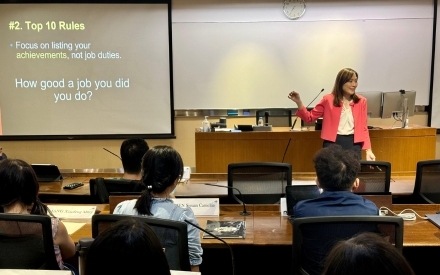Faculty Profile
PhD - Econometrics and Statistics (University of Chicago)
Prof. Guanhao (Gavin) Feng is an Associate Professor of Finance and Statistics at the City University of Hong Kong. He is also the Director of the College of Business Research Centre of Fintech and Business Analytics. Gavin earned his Ph.D. and MBA from the University of Chicago in 2017. Gavin focuses on tackling empirical challenges in asset pricing and FinTech by developing methodological solutions that leverage machine learning, generative AI, Bayesian statistics, and financial econometrics. His work has been published in leading journals such as the Journal of Finance, Journal of Financial Economics, Journal of Financial and Quantitative Analysis, Journal of Econometrics, and International Economic Review. He is the principal investigator for various external research grants, such as the HKRGC ECS and GRF grants, and the NSFC youth science fund. Gavin’s research has been acknowledged by practitioners, receiving research awards from INQUIRE Europe, Hong Kong Institute for Monetary and Financial Research, and the AQR Insight Award.
How do you combine theoretical concepts with the latest industry practices and business trends?
In the tradition of Chicago economics, theory is a rigorous framework to understand incentives and market behavior, not just abstract ideas. I combine this with the latest industry trends by integrating empirical evidence and real-world cases, especially in fast-moving areas like FinTech and AI. For instance, when covering blockchain or machine learning, I focus on how these innovations affect market frictions and asset pricing. This approach helps students develop strong analytical skills and practical judgment, enabling them to understand both the economic significance and appropriate application of new technologies in finance.
What books would you recommend CityUHK MBA students to read? Why?
- "AI Superpowers: China, Silicon Valley, and the New World Order" by Kai-Fu Lee
A clear overview of AI’s development and impact on global economies and industries, helping students grasp the strategic importance of AI.
- "A Random Walk Down Wall Street" by Burton G. Malkiel
This classic introduces efficient market theory and investment principles, emphasising the importance of understanding market behavior through a rigorous, evidence-based lens.
- "Misbehaving: The Making of Behavioral Economics" by Richard H. Thaler
This book offers foundational insights into behavioral economics, crucial for understanding market anomalies and investor behaviour beyond traditional models.
What business topics should CityUHK MBA students be the most familiar with when they graduate from our programme?
MBA students should focus on three critical areas. First, data literacy and digital thinking are essential for interpreting information and optimising decisions in markets. Second, understanding technological transformations—such as AI and blockchain—is key, as these innovations reshape financial markets and business models. Third, strategic adaptability grounded in economic reasoning enables students to evaluate trade-offs and make informed decisions under uncertainty. These competencies reflect our emphasis on market incentives and empirical analysis and are vital for leadership across industries facing rapid change and complexity.
One career advice to our CityUHK MBA students.
My advice to CityUHK MBA students is to focus on developing durable thinking habits rather than chasing the latest “hot” skills. Tools and industries evolve, but the ability to learn continuously and reframe problems in new contexts remains invaluable. Equally important is mastering clear communication—being able to explain complex ideas simply and persuasively, especially to those outside your field. This combination of adaptable thinking and effective communication is key to long-term success in any business environments.
Any other information that you feel comfortable sharing with our prospective students?
In the CityUHK MBA programme, you gain more than tools—you develop clearer thinking in a rapidly changing world. Learning alongside peers with diverse perspectives broadens your approach to problems and decisions. As faculty, I aim not only to share knowledge but to help you connect ideas, challenge assumptions, and apply rigorous economic reasoning to make better real-world decisions. This intellectual rigor and diversity prepare you to navigate complexity and lead effectively across industries.










